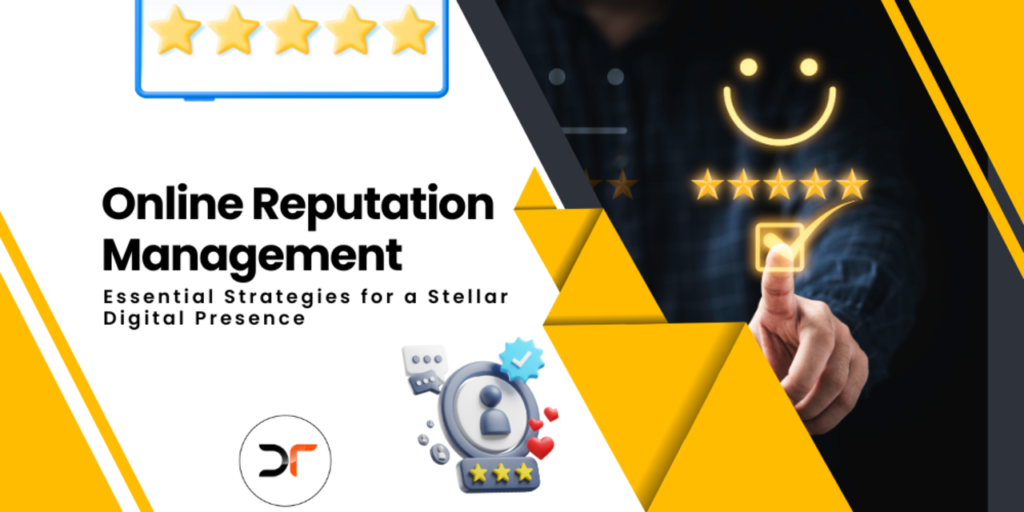In the digital age, a business’s reputation is greatly shaped by its online presence.
Online Reputation Management
Therefore, Online Reputation Management (ORM) is an essential element of any business approach. In this detailed guide, we’ll delve into efficient strategies for managing one’s online reputation, which can assist companies in establishing a reliable and reputable presence on the digital landscape.
Table of Contents
- Understanding Online Reputation Management
- The Difference between SEO and ORM
- Essential Online Reputation Management Strategies
- Community Engagement
- Implementing Online Reputation Management
- The Role of Honesty in ORM
- Conclusion
- FAQs
Understanding Online Reputation Management
Online Reputation Management involves managing and shaping a company’s digital presence. In the modern, interconnected world, a company’s digital reputation can significantly impact its success. A strong, positive online reputation can help Attract new customers, retain existing ones, and ultimately promote business expansion.
ORM involves a range of activities, from monitoring online conversations about the brand to responding to customer queries and complaints, managing negative online reviews, and promoting positive content about the business. The ultimate goal of ORM is to ensure that when people search for your business online, they find positive and accurate information.
The Difference between SEO and ORM
While both SEO (Search Engine Optimization) and ORM aim to improve a business’s online visibility, they serve different functions. SEO is about optimizing a website to increase its visibility on search engines like Google and Bing, aiming to rank higher in the search results for relevant keywords. On the other hand, ORM focuses more on managing the overall online perception of a brand, which involves much more than just search engine rankings.
Essential Online Reputation Management Strategies
Maintaining Transparency
Honesty and transparency are fundamental in building trust with customers. Businesses should avoid making false promises or misleading their customers, as these practices can severely damage their online reputation. Instead, businesses should be clear and open about what they can offer, which will help in building long-lasting relationships with customers.
Effective Use of Social Media
Social media platforms provide great avenues for Businesses should interact with their customers to build a positive brand reputation. Businesses should use these platforms to engage with their audience, respond to their queries, and manage any negative comments. This proactive engagement can help businesses build positive brand impressions and manage their online reputation effectively.
Data Protection
Data security is a critical aspect of ORM. Businesses must ensure that they have robust data protection measures in place to safeguard their customers’ sensitive information. This not only fosters trust with customers but also safeguards the business from potential data breaches that could harm its online reputation.
Dealing with Negative Feedback
Negative reviews and feedback can harm a business’s online reputation. However, businesses can turn these negative experiences into opportunities by responding to them promptly and professionally. By addressing customers’ concerns and taking steps to resolve the issues, businesses can demonstrate their commitment to customer satisfaction, which can enhance their online reputation.
Regularly Updating Business Listings
Business listings on various online platforms provide crucial information about the business to potential customers. Regular updates to these listings ensure that customers receive accurate and current information, improving their experience and positively affecting the business’s online reputation.
SEO Focus
SEO is a key component of any ORM strategy. By enhancing their website for search engine optimization, companies can boost their visibility in search results, thereby improving their online reputation.
SEO strategies can include keyword research, optimizing page titles and meta tags, and building high-quality backlinks.
Community Engagement
Participating in local community events can help businesses build a positive image and establish trust among their customers. This can also provide opportunities for businesses to connect with potential clients and enhance their online reputation.
Implementing Online Reputation Management
Implementing an effective ORM strategy involves creating the right online presence, ensuring that the business is easily found online, providing valuable and relevant content, interacting with customers, and being honest and reliable. Businesses should also leverage the power of social media to connect with their audience and manage their online reputation.
The Role of Honesty in ORM
Honesty plays a vital role in ORM. A business that operates ethically and transparently will naturally have a positive online reputation. While online reputation management is crucial, businesses must also prioritize offering top-notch products or services and exceptional customer service. These are the foundations of a robust and positive online reputation.
Importance of Online Reputation Management (ORM)
Online Reputation Management (ORM) has become a critical component of any business strategy in the modern digital landscape. Here are several reasons why ORM is so important for businesses:
Building Trust with Customers
- Positive Online Presence: A good reputation online helps in building trust among potential and current customers.
- Customer Reviews and Feedback: Regular monitoring and responding to customer reviews and feedback can enhance trustworthiness.
Managing Online Image
- Control Over Brand Image: ORM allows businesses to influence and control their brand image online.
- Crisis Management: Effective ORM strategies can help mitigate the impact of negative publicity. Driving Business Growth
- Customer Attraction: Positive online reviews and ratings can attract new customers.
- Customer Retention: By addressing customer complaints and concerns promptly, businesses can increase customer loyalty.
ORM Strategies for Businesses
To effectively manage an online reputation, businesses can implement the following strategies:
- Regular Monitoring: Keep track of what is being said about the business on various online platforms.
- Engagement: Actively engage with customers by responding to reviews, comments, and queries.
- Content Creation: Publish positive and high-quality content to improve online visibility and search rankings.
- Social Media Management: Keep being active on the updated text: Use social media sites to interact with customers and advertise. This helps create a good image of your brand.
- SEO Practices: Implement SEO strategies to ensure positive content ranks higher in search engine results.
- Transparency: Be transparent in communication, especially when addressing issues or negative feedback.
By integrating effective ORM into their overall business strategy, companies can safeguard their online reputation, which is a priceless resource in the modern digital era.
Conclusion
Online Reputation Management is important aspect of any business strategy in today’s digital world. By implementing effective ORM strategies, businesses can manage their online image, build trust with their customers, and drive business growth.
FAQs
1. What is Online Reputation Management?
Online Reputation Management is all about making sure a company looks good on the internet.
2. What is the difference between SEO and ORM?
While both SEO and ORM aim to improve a business’s online visibility, SEO focuses on optimizing a website for search engines, while ORM focuses on managing the overall online perception of the business.
3. Why is ORM important?
ORM is important as it helps businesses manage their online image, build trust with their customers, and drive business growth.
4. What are the key components of an effective ORM strategy?
An effective ORM strategy includes maintaining transparency, effective use of social media, data protection, dealing with negative feedback, regularly updating business listings, focusing on SEO, and community engagement.
5. What role does honesty play in ORM?
Honesty plays a vital role in ORM. A business that operates ethically and transparently will naturally have a positive online reputation.










